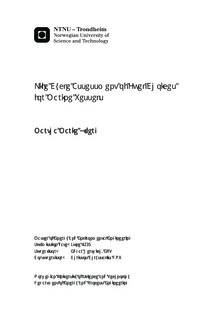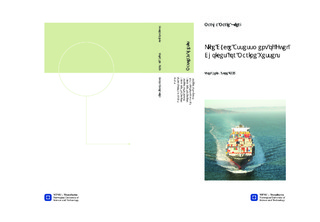| dc.description.abstract | Transporting 80% for the total volume of goods in the world, shipping is currently the backbone of the global economy. The global fleet consists of multiple types of vessels, which delivers various forms of services. As the global economy grows, and the shipping fleet with it, the concern in local and international communities of the environmental impact of shipping has increased.
Introduction of alternative fuels as a step towards a more environmental friendly shipping industry has been evaluated. The goal of this study has been to develop and illustrate a life-cycle based approach to evaluate the environmental impact of fuel choice for different marine vessels and their typical operational pattern.
The Life Cycle Assessment performed evaluates six fuel choices (heavy fuel oil(HFO), marine diesel oil/marine gas oil (MDO/MGO), liquefied natural gas (LNG), methanol, dimethyl ether (DME) and Fischer-Tropsch diesel) for two types of vessels (RoPax ferry and large container ship). The study assess environmental impacts generated over the life cycle of the different fuels, from the extraction of resources, fuel production and distribution, and the combustion. By using 18 environmental midpoint indicators, the fuel choices have been compared with respect to their environmental performance. The report emphasized the impact indicators Agricultural land occupation potential (ALO), Global warming potential (GWP) and Particulate matter formation potential (PMFP).
The results give an ambiguous answer of which fuel has the best environmental performance when used for marine applications. The results for LNG show a drastic reduction in PMFP, but the use of LNG does not change the GWP significantly compared to HFO. In addition, the results show that low sulfur fuels in general provide a clear reduction of PMFP. The potential impact of particulate matter is in large extent caused by the combustion process for all fuel choices. The PMFP generated by biofuels is mainly a result of NOX emissions, while PM and SOX emissions are also important contributors considering conventional fuels.
In terms of GWP, the implementation of biofuels shows a clear reduction potential. A substitution of HFO with methanol, DME or FT-diesel results in a reduction of GWP equal to 56%, 80% and 78%. However, the results are found very sensitive to inclusion of emissions related to biomass storage. For fossil fuels, the CO2 emitted along the life cycle is the main contributor of the GWP, while the GWP of biofuels is to a large extent generated by N2O and CH4 in addition to CO2.
Increased agricultural land occupation is a consequence of using biofuels. The performed study shows that the environmental impact is to primarily related to the type of feedstock applied in the biofuel production. The results show lower impact for the fuels produced from short-rotation wood, i.e. Dimethyl ether and FT-diesel, compared to forest wood, which was utilized in the methanol production.
It is believed that this study provide further insight of which processes and stressors are primarily causing potential impacts to the environment along the life cycle of each fuel. Considering the three impact categories emphasized in this study, Fisher Tropsch-diesel and Dimethyl Ether appear as the most promising fuel alternatives for marine application. | |

